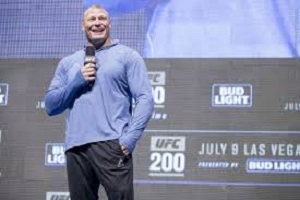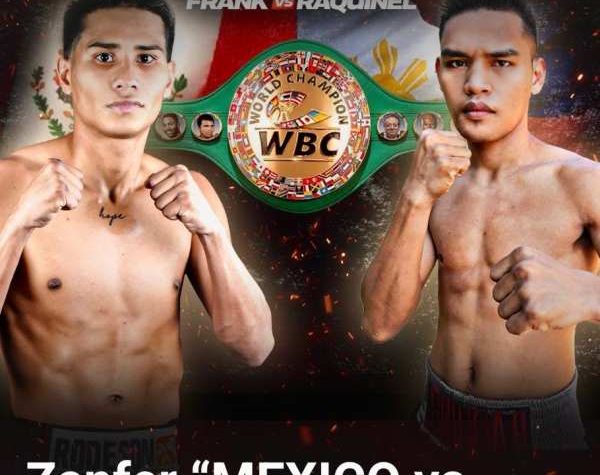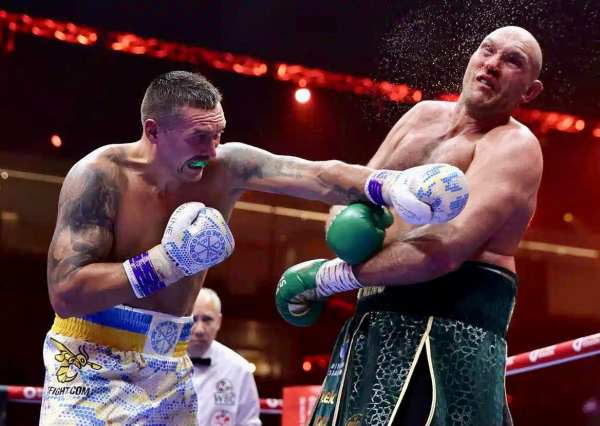
MMAfighting.com
You, the fans, have burning questions about the recent news in MMA – from Brock’s supposed retirement to Rory’s not-a-retirement-but-boy-it-sure-seems-like-he-wants-to-hang-them-up to ONE Championship’s forced retirement for agents. I, some dude who hasn’t been fired yet, have the hottest takes in the game. I was always raised to fight fire with fire so let’s get into it.
Brock’s retirement

John-Jo Carter@johnjo_carterReplying to @JedKMeshew @MMAFighting
What’s the real reason Brock retired?12:57 AM – May 3, 2019Twitter Ads info and privacySee John-Jo Carter’s other Tweets
So, as you may have heard, this week, Dana White announced that Brock Lesnar would not be returning to the UFC and that instead, Stipe Miocic would get his rematch with Daniel Cormier for the UFC heavyweight title. It was an unfortunate announcement, not because Brock deserved a title shot but because the heavyweight division has been on hold waiting for him and now it appears that prolonged stasis was for naught. Of course, it may not actually be true.
Per reports, Lesnar was still enrolled in the USADA drug testing program and had been tested as recently as a few weeks ago. When those reports came out, many fans jumped to the conclusion that Lesnar failed a test and that’s why this sudden retirement happened; after all, the last time Brock popped, he just walked away from MMA. But I’m going the other way on this. I think Brock remaining in the USADA pool is more evidence towards the fact that he’s still interested in coming back, but that he and the UFC can’t come to terms on a deal.
Rumors are flying that with the UFC’s move to the ESPN+ platform, Lesnar wanted a higher base salary to go along with his PPV points and the UFC wouldn’t budge. If true, that’s smart of Lesnar considering the initial PPV event on the ESPN+ platform is rumored to have done horrendous numbers. However, the UFC’s deal with ESPN makes it so PPV draws have less leverage than ever before, so it seems entirely plausible that they won’t budge on their offer and so instead, the UFC will just run with the rematch nobody but Stipe wants.
It’s important to remember that most of this is pure speculation, but if there’s one thing we should know by now, it’s that Brock Lesnar likes to make money and is very good at it. He has played the UFC and the WWE against each other for years and has maximized his earning potential the whole while. Brock knows his worth and it is much more plausible to me that he is refusing to fight for less when he can just hold out and get a better offer somewhere else.
Rory’s Grand Prix win.

Brian Harrington@Brian_HarryReplying to @JedKMeshew and 2 others
Why is it that Rory went through to the next stage of the tournament? Didn’t win on any score card. He should keep title but step out, Fitch fight Neiman, and Rory fight winner of tournament especially after saying what he said post fight. Seems like time away is what he needs.1:01 AM – May 3, 2019Twitter Ads info and privacySee Brian Harrington’s other Tweets
At Bellator 220, Rory MacDonald faced off with Jon Fitch in the quarterfinals of the Bellator Welterweight Grand Prix, in a fight that also doubled as his first title defense. It was as close to a disaster as possible. The fight resulted in a majority draw, with Fitch taking the one open scorecard, but MacDonald moving on in the tournament. Then, afterwards, MacDonald revealed that he was unsure of his fighting future, saying, “I don’t know if I have that same drive to hurt people anymore.”
From a purely practical standpoint, MacDonald is moving on in the tournament by virtue of being the champion. This may be an entirely unique situation, I’m not sure, but the only reason MacDonald gets to move on is because he did not lose his belt since champions retain in a draw. By that logic, it does make sense that he gets to advance, but it does reveal the disconnect in allowing your champion to compete in the Grand Prix in the first place. It also makes you wonder what would have happened had Fitch been fighting a non-champion? How would the draw have resolved itself then?
Also, I get the argument that Fitch should advance because he took the lone winning scorecard in the fight. And frankly, after Rory’s comments I initially suggested Coker strip MacDonald of the title, advance Fitch, and run the GP for the belt, with Rory challenging for it after having some time to reflect on what he wants. However, Rory did release a statement a few days later and said he intends to carry on in the tournament as planned. Whether his heart will truly be in it is anyone’s guess but I’m generally of the belief you have to take fighters at their word when they say they still want to fight. Perhaps Rory doesn’t really have the drive anymore and he just feels compelled to see this out, but even if that’s true, it’s his life and his career and he’s earned the right for us not to question him when he says he’s fighting Neiman Gracie in 6 weeks. In the meantime, Fitch can fight Paul Daley for a shot at the eventual winner of this Grand Prix.
ONE’s controversy

Icarus@damn_its_hot_Replying to @JedKMeshew @MMAFighting
What’s your take on one fc regulating agents while being the promotion, while a week before they also said they would be opening an agent firm themselves? Seems very shady. Esp after chatri said he wanted to bring back honor etc to the game. Seems like the opposite1:41 AM – May 3, 2019Twitter Ads info and privacySee Icarus’s other Tweets
This week, ONE Championship sent out a press release announcing major changes to its “agent certification” program, wherein is declared that an agent representing any ONE Championship athlete must pass their accreditation process. In short, ONE said it could blackball any agent for a number of reasons including not living in Asia, having a criminal record, or having a history of being sued by athletes. This announcement kicked up a lot of dust with a number of agents, and with good reason: It’s pretty ridiculous.
On its face, this program is intended to protect fighters from disreputable agents and predatory practices, an admirable goal. However, the “live in Asia” requirement does nothing to prevent shady individuals from repping fighters, it just means those individuals have to reside in Asia, the most populated continent on the planet. A cynical man might look at this and say this is a way to bottleneck young talent and young talent reps under their own umbrella, for their own gain.
Let’s be clear, the core idea of an agent certification isn’t absurd. Other sports leagues have them, the NFL for instance. But the NFL’s certification is run through the Player’s Association, not through the league office, and entangling the two is, at best, terrible optics and at worst, legitimately shady. Perhaps worse still, considering the number of high-profile international talent that ONE has signed lately, it’s unlikely that they will apply this rule evenly. For instance, Demetrious Johnson is repped by Malki Kawa, who does not live in Asia but it strains credulity to think that ONE will cut off with Kawa or Johnson. Instead, it appears ONE will give passes to established agents in the game because they will still want the talent those agents represent. Which begs the question, why make those rules in the first place?
Dana White and 165

Chris Poole@MapleBacon88Replying to @JedKMeshew @MMAFighting
Should Dana White be shown the door, in order to allow the sport to grow, and potentially add new divisions?2:47 AM – May 3, 2019Twitter Ads info and privacySee Chris Poole’s other Tweets
Dana White’s relationship with the growth of MMA is fun to consider. Though he certainly caught more than a few lucky breaks, it would be asinine to say he wasn’t pivotal in the growth of the sport today. If there’s a Mount Rushmore of MMA, Dana is definitely on it. However, there was a legitimate window after the signing of the FOX deal where Dana appeared to be a liability. His manner of doing business – basically Ari Gold with less charisma – does not really fit in with the world today (or at the time). If the UFC was a publicly traded company instead of privately owned by his best friends, I think there is a real chance Dana would have been handed walking papers already. But instead, he hung around and showed his worth. Decry him all you want – often times he deserves it – but the man has a vision and has proven proficient at effectuating it. Dana definitely played a role in the UFC getting bought for $4.2 billion. He also had a hand in the UFC’s new deal with ESPN, which is gangbusters for them. Dana has a knack for getting big things done.
The best way to think of Dana is as a war-time consigliere. When the UFC is in stasis mode, Dana, for lack of a better word, wallows. It seems pretty obvious his heart is not in the sport as it once was – whose would be after this many years? – after the FOX deal when there were no more nations to conquer. Dana seemed disengaged. But when the TV rights came up and the ESPN deal came into full effect, Dana has been making moves which will grow the UFC, and as a result, MMA. The worldwide leader in sports is now fully invested in MMA, and a non-trivial amount of that is due to Dana White.
Oh, and he’s totally right about not adding new divisions. 165 is a waste of time. It’s five pounds different from 170. That is not a difference anyone should care about, at all. And if you’re saying we need a cruiserweight division, just get all the way out. 205 barely has enough talent in it as is. The division structure is completely fine as it stands.
CTE and personal accountability

Eric Stinton@TombstoneStintReplying to @JedKMeshew @MMAFighting
To what extent should we ascribe fighters’ wrongdoings (domestic violence etc) to CTE?11:09 AM – May 3, 2019Twitter Ads info and privacySee Eric Stinton’s other Tweets
This is a less topical question but one that remains ever-present in MMA. Just this week, Renato “Babalu” Sobral came out and announced that he believes he is suffering from CTE. I hope he is wrong, but fear he is not. Awareness surrounding head trauma and the development of CTE has risen sharply in recent years, largely driven by research into the NFL and the effect of concussions. Because CTE cannot be officially diagnosed until after death, and MMA is so young as a sport, MMA has yet to feel the pressure that numerous CTE diagnoses will bring to bear but given what we know about CTE, it seems like that train will be coming soon.
How it will affect MMA when it does is an interesting question. After all, unlike football, MMA is a combat sport – there’s an inherent risk to competition that fighters assume, including a direct and tangible amount of brain trauma. However, it will be interesting to see studies on CTE and how weight cutting may affect it, and as a result, how MMA sanctioning bodies will react. Maybe they won’t do anything – basically everyone in MMA acknowledges that cutting weight is bad for you and that has done little to curtail the practice – but maybe they finally determine that the assumption of risk fighters take is not enough to absolve them of the issue, and come up with stricter rules around weight-cutting.
As for how we should view the wrongdoings of fighters, and whether we should consider CTE in our determinations, that is an even more complicated subject. Where to draw that line is tricky. I believe in personal accountability. I also believe that genuine medical issues can play a mitigating factor to some degree but it’s hard to ascribe wrongdoing to something in real time that we cannot diagnose until after the fact, especially in a sport where so many competitors coming in are already among the broken or maladjusted. As a general rule I would say we can’t ascribe wrongdoing to CTE at this point, but in the future it certainly may be something we have to consider more and more.





More News
Casimero TKO’s Sanchez in 1st round
Raquinel wins WBC Continental Americas super flyweight title
Frank vs Raquinel on ABEMA LIVE PPV